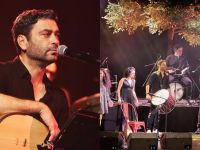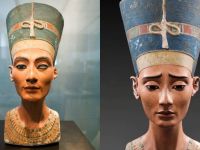The Israeli army was preparing for further bloody clashes following a Palestinian "day of rage" which brought the death toll from more than a week of violence to over 80.
Efforts to limit the casualties in the Israeli-Palestinian conflict failed Friday, with at least eight people killed in further violence, including a 12-year-old boy shot dead by Israeli border guards in Jerusalem's Old City.
Four other Palestinians were killed in the Gaza Strip flashpoint of Netzarim.
Two more died in clashes with Israeli soldiers east of Nablus in the West Bank, another was killed in Tulkarem, also in the north, and one died of wounds received Monday.
Meanwhile, in Jordan, a Palestinian refugee was killed and six others injured as police there put down an anti-Israeli demonstration, witnesses told AFP.
The deaths brought to 86 the total number killed since September 28 -- 73 Palestinians, 10 Israeli Arabs and three Israeli Jews -- in violence, which began in Jerusalem after Israeli opposition leader Ariel Sharon visited a site sacred to Muslims as well as Jews.
The toll is now higher than the last serious violence four years ago.
Israel's army chief of staff Shaul Mofaz predicted the clashes may continue, blaming Palestinian leader Yasser Arafat for not giving "clear instructions to put an end to the violence" to paramilitary fighters allied to his Fatah faction.
On Friday Israeli forces were on red alert across the country for fear of trouble as Palestinian groups, including the radical Hamas and Islamic Jihad, had called for a "day of rage" against the violence.
The Israelis sealed off the West Bank and Gaza Strip, but in Jerusalem they tried to keep a low profile, while maintaining 1,000 police on hand in case of trouble.
Those forces were soon in action, firing rubber bullets on Palestinian demonstrators throwing stones from the Old City walls after prayers at the sacred al-Aqsa mosque compound, killing one and wounding several.
Prayer leaders had urged the 15,000 congregation at the mosque, where seven had died in clashes the week before, to keep calm. "Please don't provoke them and make them come back again. You are in a holy place, you are in al Asqa," they said.
Friday evening, elite Israeli police resumed control over the mosque compound, dispersing remaining demonstrators and bringing down a Palestinian flag that flew there throughout the day.
Clashes also erupted in the West Bank and the Gaza Strip after tens of thousands of Palestinians spilled out of mosques into the streets.
Many threw stones at Israeli soldiers and in Ramallah, witnesses said demonstrators burned pictures of Prime Minister Ehud Barak and right-wing opposition leader Sharon.
Sharon is blamed by the Palestinians and many members of the international community for sparking the violence on Thursday last week by visiting the al-Aqsa mosque compound.
The site is the third holiest in Islam but also sits atop the vestiges of Judaism's most sacred shrine and control over the area is the key stumbling block in efforts to forge an Israeli-Palestinian peace accord.
Tensions had eased markedly Thursday, despite the failure of US Secretary of State Madeleine Albright to secure a comprehensive ceasefire accord from Barak and Arafat in Paris on Wednesday night.
Earlier Friday, the UN Security Council wrapped up a five-hour discussion without agreeing on a draft resolution condemning Israel's "excessive use of force", but without naming the Jewish state.
But Britain's ambassador to the United Nations, Jeremy Greenstock indicated the council would vote on the issue later in the day.
In Cairo, Egyptian President Hosni Mubarak announced Friday that leaders from the Arab world will meet in a summit on October 21 and 22 to discuss the "deteriorating situation in the Palestinian territories."
Elsewhere in the Arab world, Jordan put a ban on any more anti-Israeli demonstrations after a Palestinian refugee was killed.
In a northern suburb of Tunis Arafat told several thousand people at a mass meeting co-presided by Tunisian President Zine El Abidine Ben Ali that Jerusalem "will be the capital of Palestine whether the Israelis like it or not."
He added: "Anyone who does not accept that can go drink from the Dead Sea.” – JERUSALEM (AFP)
© 2000 Al Bawaba (www.albawaba.com)







